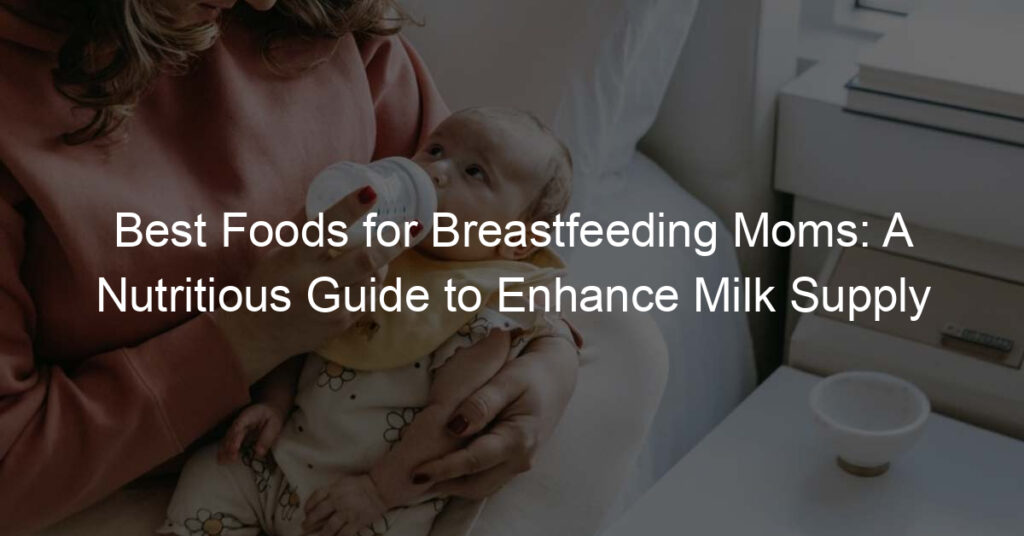Breastfeeding is not only essential for providing essential nutrients to your baby, but it also helps in creating a strong bond between you and your child. Maintaining a healthy diet while breastfeeding is crucial for both the mother and the baby.
The Best Foods for Breastfeeding Moms can improve the quality and supply of your breast milk to ensure your baby’s growth and development.
As a breastfeeding mom, it’s important to consume a variety of nutrient-rich foods. Your diet should include an abundance of proteins, whole grains, fruits, and vegetables to provide all the necessary nutrients for you and your baby.
Adequate hydration is also vital as it helps in maintaining a good supply of breast milk.
The choices you make in terms of your diet can significantly impact the well-being of both you and your baby.
It’s essential to be aware of the best foods for breastfeeding moms and make informed choices in order to maintain a balanced and nutritious diet.
Key Takeaways
- A healthy diet and proper hydration are crucial for breastfeeding mothers to ensure adequate breast milk supply and quality.
- Consuming a variety of nutrient-rich foods, such as proteins, whole grains, fruits, and vegetables, supports both the mother’s and baby’s health.
- Being informed about the best food choices for breastfeeding can greatly benefit both you and your child.
Benefits of Breastfeeding

As a breastfeeding mother, it’s important to understand the various benefits that come with breastfeeding. We will discuss the nutritional value, the immune system boost, and the bonding period that occurs during breastfeeding.
Nutritional Value
Breast milk is considered the perfect food for your baby, as it is packed with all the essential nutrients and vitamins they need to grow and develop.
Not only does breast milk provide a unique balance of proteins, fats, and carbohydrates, but it also naturally adapts to meet the changing needs of your growing infant.
Immune System Boost
Breastfeeding helps to strengthen your baby’s immune system by providing antibodies and other immune-boosting substances that protect them against illness and infection.
Babies who are breastfed are less likely to develop infections, allergies, and asthma and typically experience fewer instances of diarrhea, ear infections, and respiratory problems.
Bonding Period
Breastfeeding offers an unparalleled opportunity for bonding with your baby. The close physical contact and snuggling experienced during breastfeeding help to foster a strong emotional connection between you and your child.
This nurturing bond not only helps your baby feel safe and secure, but it also lays the foundation for a healthy, positive parent-child relationship as they grow.
Essential Nutrients for Breastfeeding Moms

As a breastfeeding mom, it’s crucial to focus on consuming a balanced diet with specific essential nutrients that help support both your health and your baby’s growth. In this section, we will discuss the importance of protein, calcium, iron, and omega-3 fatty acids in your breastfeeding diet.
Protein
While you’re breastfeeding, your body’s demand for protein increases to ensure adequate milk production and support your baby’s growth.
Aim to incorporate a variety of protein-rich foods, such as lean meats, poultry, seafood, eggs, legumes, and dairy products, in your daily meals.
The CDC also advises taking care when choosing seafood, as some fish contain mercury that can pass from mother to infant through breast milk.
Calcium
Calcium plays a vital role in supporting strong bones and teeth for both you and your baby. Breastfeeding moms need around 1,000 milligrams of calcium daily.
Consuming foods high in calcium, such as dairy products, dark leafy greens, and calcium-fortified foods, can help you meet this requirement.
If needed, you can also consider a calcium supplement.
Iron
Iron is essential for maintaining your energy levels and supporting your baby’s brain development. Breastfeeding moms need around 9 milligrams of iron per day, which can be obtained through various iron-rich foods like red meat, poultry, fish, fortified cereals, beans, lentils, and spinach.
In some cases, your healthcare provider might recommend an iron supplement, especially if you had low iron levels during your pregnancy.
Omega-3 Fatty Acids
Omega-3 fatty acids, especially DHA, are essential for your baby’s brain and eye development. It’s crucial to incorporate omega-3-rich foods, such as salmon, sardines, chia seeds, flaxseeds, and walnuts, into your breastfeeding diet.
Experts recommend that nursing moms aim for at least 200-300 milligrams of DHA per day. If you’re not consuming enough through your diet, consult your healthcare provider about omega-3 supplements.
Remember, achieving a balanced diet with the right nutrients is fundamental to your and your baby’s health while breastfeeding.
Focus on incorporating these essential nutrients in your daily meals, and consult your healthcare provider for personalized recommendations.
Best Foods for Breastfeeding Moms

Breastfeeding moms need to maintain a well-balanced diet to provide essential nutrients for themselves and their babies.
The following foods are important to incorporate into your meal plan:
Leafy Greens
Leafy greens, like spinach and kale, are highly nutritious and an excellent source of vitamins A, C, E, and K. Additionally, these greens are rich in calcium and iron, crucial for your baby’s growth and development.
Try incorporating leafy greens in salads, smoothies, or as a side dish to ensure you’re getting the necessary nutrients.
Lean Proteins
Lean proteins, such as chicken breast, turkey, tofu, and legumes, are important for breastfeeding moms, as they provide essential amino acids necessary for maintaining a healthy milk supply.
Consider adding lean proteins to your meals, like grilled chicken in salads or lean turkey in sandwiches, to provide essential nutrients for you and your baby.
Whole Grains
Whole grains like oatmeal, brown rice, and whole wheat bread provide essential fiber, B vitamins, and minerals like iron, magnesium, and selenium. Consuming whole grains can help you stay full and energized throughout the day.
Try incorporating oatmeal as a breakfast option or using whole-grain pasta in your dinner recipes.
Fruits and Vegetables
A variety of fruits and vegetables is vital for providing essential vitamins and minerals to both you and your baby. They will also add flavor, color, and texture to your meals, making them more enjoyable.
Aim to incorporate a range of colorful fruits and vegetables into your diet, such as berries, carrots, and bell peppers.
Healthy Fats
Healthy fats, such as those found in avocados, nuts, and seeds, provide essential fatty acids crucial for your baby’s brain development.
Additionally, these fats can help keep you full and satisfied, preventing excessive hunger during breastfeeding. Include healthy fats in your diet by adding avocado slices to your sandwiches or snacking on a handful of nuts and seeds throughout the day.
Hydration and Breastfeeding

Staying hydrated is crucial for breastfeeding moms, as it helps maintain an adequate supply of breast milk for your baby. Though individual needs vary, it’s generally recommended to drink at least eight glasses of water, milk, or other beverages per day.
When breastfeeding, you may notice an increased thirst. This is your body’s natural response to the extra fluid requirements for milk production.
Make sure to have a glass of water or other hydrating drink nearby each time you nurse.
The inclusion of water-rich foods in your diet can also contribute to your hydration levels. Fruits like watermelon and vegetables like cucumber are good options for meeting your fluid needs.
Keep in mind the following important points to ensure proper hydration:
- Monitor your urine color: A pale yellow color indicates proper hydration, while dark yellow or amber-colored urine suggests you need more fluids.
- Avoid excessive caffeine intake: Consuming too much caffeine may lead to dehydration, irritability in your baby, and sleep disturbances. Stick to two to three cups of coffee or tea per day.
- Limit consumption of alcoholic beverages: Alcohol can affect your breast milk and baby. If you choose to drink alcohol, wait at least two hours after consumption before breastfeeding.
By maintaining good hydration and incorporating a variety of water-rich foods, you can support your breast milk production and ensure your baby receives optimal nutrition.
Dietary Concerns

Breastfeeding moms need to be mindful of their diets to ensure that they are providing the best possible nutrition to their babies.
Let’s look at some specific concerns related to the consumption of certain foods for breastfeeding mothers.
Possible Allergens
Some babies may be sensitive to specific allergens present in a mother’s diet. While breastfeeding, be aware of your baby’s reaction to what you eat.
If your baby appears to have an allergic reaction, such as skin rash, wheezing, or excessive fussiness, it could be due to something in your diet. Common allergens include:
- Cow’s milk and dairy products
- Eggs
- Peanuts and tree nuts
- Soy
- Wheat and gluten
If you suspect an allergen might be causing your baby’s reaction, try eliminating it from your diet and observe any changes in your baby’s behavior.
It is always a good idea to consult with your healthcare provider or a pediatrician before making any significant changes to your diet.
Avoiding Certain Foods
In addition to potential allergens, breastfeeding mothers should avoid certain foods because they may affect the quality of the breast milk or harm the baby’s health.
- Fish high in mercury: Mercury can be harmful to a baby’s developing nervous system. Limit your intake of fish known to contain higher levels of mercury, such as tuna, albacore, king mackerel, swordfish, and shark. Instead, opt for low-mercury options like salmon, sardines, and trout.
- Alcohol: Alcohol can be passed through breast milk to the baby. It is best to avoid alcohol altogether; however, if you decide to drink, allow at least 2 hours for your body to metabolize the alcohol before breastfeeding your baby.
- Caffeine: Excessive caffeine intake may lead to irritability or difficulty sleeping for your baby. Limit your intake to no more than 200-300 mg of caffeine per day, which is approximately 2-3 cups of coffee.
- Certain herbs and supplements: Some herbs and supplements are not recommended for breastfeeding mothers. Always confirm with your healthcare provider before taking any new supplement or herb to ensure it is safe for both you and your baby.
As a breastfeeding mom, ensuring your diet is well-balanced and rich in essential nutrients is important for both your health and your baby’s growth.
Be mindful of potential allergens and avoid certain foods to provide the best possible nutrition to your baby. Consult with your healthcare professionals if you have any concerns or questions about your diet.
Conclusion
As a breastfeeding mom, your diet plays a crucial role in providing the right nutrients for both you and your baby. It’s essential to include a variety of nutrient-rich foods in your diet to ensure optimal health.
By incorporating foods high in protein, omega-3 fatty acids, and essential vitamins and minerals, you can promote your baby’s growth and development.
Some examples of these foods are salmon, sardines, and dairy products.
Additionally, consuming fruits, vegetables, and whole grains can provide you with the necessary fiber and antioxidants to support your overall well-being.
It’s also important to stay well-hydrated by drinking water and avoiding excessive caffeine and alcohol consumption.
If you’re concerned about meeting all of your dietary needs while breastfeeding, don’t hesitate to consult with a healthcare professional.
They can guide you in selecting the appropriate supplements, such as iodine or choline, to ensure that both you and your baby receive adequate nutrition during this crucial time.
Remember, a balanced and varied diet will not only benefit your health but also contribute to a strong and healthy foundation for your baby’s growth.
Frequently Asked Questions
What fruits should be consumed to enhance breast milk production?
Fruits such as avocado, papaya, and bananas are known to be beneficial for breastfeeding mothers. Avocado is rich in healthy fats and helps to provide more energy.
Papaya is known to potentially increase milk supply, while bananas offer essential nutrients that support both the mother’s and baby’s health.
How can a vegetarian diet benefit lactating mothers?
A vegetarian diet can provide all the necessary nutrients for a breastfeeding mother. Include a variety of protein-rich foods like beans, lentils, tofu, and dairy products to meet your protein needs.
Whole grains, fruits, and vegetables supply essential vitamins and minerals that are vital for your health and the baby’s.
What is the impact of certain foods on a baby’s gas level through breast milk?
Some foods may cause gas or discomfort in your baby when consumed in large quantities. Common culprits include cruciferous vegetables (such as broccoli and cabbage), beans, and spicy foods. However, reactions may vary from one infant to another.
Pay attention to your baby’s reactions and adjust your diet accordingly.
Which food items help in calming a breastfeeding baby?
Some foods are believed to have a calming effect on a nursing baby. For example, fennel tea has been traditionally used to soothe colic and gas in infants. You can also try consuming mild-flavored foods like oatmeal, which is easier to digest.
Are there specific foods to avoid while nursing?
In general, you do not need to restrict your diet while breastfeeding. However, it’s important to watch your consumption of caffeine, alcohol, and fish with high mercury levels.
Limit your caffeine intake to no more than 300 mg per day, avoid alcohol or consume it in moderation, and stick to seafood low in mercury.
What is the ideal diet plan to lose weight for breastfeeding mothers?
It is important to prioritize your health and nutrient needs while breastfeeding. Focus on consuming a well-balanced diet that includes whole grains, lean proteins, healthy fats, fruits, and vegetables.
Monitor your portion sizes and eat mindfully to avoid excessive weight gain. However, do not pursue aggressive weight loss plans, as they may negatively affect your milk supply and energy levels.














